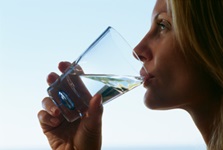 First Lady Michelle Obama recently announced her latest healthy living initiative called “Let’s Move.”
First Lady Michelle Obama recently announced her latest healthy living initiative called “Let’s Move.”
The program is aimed at getting more people to drink water rather than sugary drinks when they’re feeling thirsty. The program is definitely needed in the U.S., since, according to the Centers for Disease Control and Prevention, Americans don’t realize the health benefits of water and drink fewer than four cups a day.
However, the campaign doesn’t outline the health benefits of water—after all, they’re pretty self-explanatory. One of the obvious reasons is it’s much better for you than sugary drinks such as soda. With obesity at epidemic levels in the U.S., encouraging people to put down the soda can and reach for the tap instead is a big reason for this push. In fact, close to 25,000 deaths in America in 2010 alone were related to some of the health risks that can come from excessive consumption of sugary drinks such as cancer, diabetes, and heart disease, according to a study conducted by the American Heart Association.
It should be noted that Obama’s initiative comes at a time when bottled water is experiencing a slight increase in sales and consumption of soda has dropped by more than 17% since 1998. It would seem that more and more people are starting to realize the health benefits of water.
While we’re always told to drink six to eight cups of water a day, that method of thinking is thought to be largely outdated. The Institute of Medicine’s Food and Nutrition board recommends that women drink approximately 2.7 liters (91 ounces) of water a day while men should try to drink around 3.7 liters (125 ounces) a day. It should be noted that this also includes water from the food you eat as well.
And don’t let your thirst be your guide. You should try to drink water at regular intervals throughout the day.
By doing so, you will avoid dehydration. The mild symptoms of dehydration include headaches and feelings of sluggishness. More severe symptoms include kidney failure, brain swelling, coma, and even death.
Eliminating waste from your body is yet another one of the major health benefits of water. Drinking plenty of water means that waste is removed from your body through either urination or sweat on days where it’s warm. By keeping hydrated when it’s hot, you’ll avoid dehydration and heat stroke.
Another one of the health benefits of water is that it keeps your joints lubricated and can help you avoid arthritis later in life. Drinking plenty of water also helps to keep your tissues healthy, something that anyone suffering from dry skin or looking to fight the effects of aging will doubtlessly appreciate.
Anyone who has suffered from kidney stones can attest to the health benefits of water. Drinking plenty of water helps to clear this painful condition.
Investing in a water filtration system is a cost-effective and environmentally-friendly way to enjoy the health benefits of water. Filters last for months, giving you clean drinking water right from the tap.
Source(s) for Today’s Article:
Amanda L. Chan, “Michelle Obama Wants You to Drink More Water,”The Huffington Post, September 12, 2012, http://www.huffingtonpost.com/2013/09/12/michelle-obama-drink-water-campaign_n_3906987.html?utm_hp_ref=healthy-living#slide=1047508 (Last accessed September 18, 2013)
“Behaviors and Attitudes Associated With Low Drinking Water Intake Among US Adults, Food Attitudes and Behaviors Survey 2007”, Centers for Disease Control and Prevention, April 11, 2013 http://www.cdc.gov/pcd/issues/2013/12_0248.htm (Last accessed September 18, 2013)
“180,000 deaths worldwide may be associated with sugary soft drinks,” American Heart Association, March 19, 2013, http://www.eurekalert.org/pub_releases/2013-03/aha-1dw031413.php (Last accessed September 18, 2013)
“Dietary Reference Intakes: Water, Potassium, Sodium, Chloride, and Sulfate,” The Institute of Medicine of National Academies, February 11, 2004, http://www.iom.edu/Reports/2004/Dietary-Reference-Intakes-Water-Potassium-Sodium-Chloride-and-Sulfate.aspx, (September 18, 2013)
